In the realm of European energy, anomalies in France’s Civaux 2 reactor have recently captured attention. The French industry regulator has identified potential stress corrosion in the reactor, though this remains unconfirmed. Given the critical role played by nuclear energy within Europe, particularly in countries like France, even minor disruptions can significantly impact energy markets. This roundup aims to consolidate expert views on the potential impacts of this situation, exploring consequences for energy markets, technological strategies, and geopolitical shifts.
Understanding the Current Reactor Situation
Concerns about Civaux 2 arise amidst Europe’s high dependency on nuclear energy. As the continent increasingly leans on nuclear power for its energy needs, France, with its extensive nuclear infrastructure, plays a pivotal role. Any indications of issues within French reactors can ripple through the European energy landscape, potentially affecting regional supply and market stability. Experts highlight that history offers clear examples of how previous reactor outages have led to increased electricity prices across Europe, a scenario which stakeholders are keen to avoid.
The potential for reduced output from such reactors raises alarms. With past episodes of stress corrosion leading to decreased nuclear energy production, the news has already influenced market perceptions. Prices of baseload power contracts in France saw a temporary surge, underscoring the delicate balance between nuclear reliability and regional energy dependencies. Analysts stress the importance of addressing these issues swiftly to maintain market confidence.
Examining Market Responses and Inflationary Pressure
Market Reactions to Reactor Uncertainties
Insights from market observers indicate that updates from Civaux 2 have immediate effects, demonstrated by shifts in energy market prices. The reaction to potential problems in the French reactor echoes previous cases when France faced similar challenges. Market volatility is a real concern, with opinions divided on whether this uncertainty might stabilize or continue to cause upheaval in energy pricing.
These market reactions aren’t just isolated to electricity contracts. Gas prices across Europe also experienced movements, reflecting the interconnected nature of the energy markets. Observers emphasize that such fluctuations are commonplace when significant contributors to the energy supply come under scrutiny, increasing both speculation and the need for strategic responses from energy providers.
Nuclear Dependency and Diversification Strategies
Europe’s nuclear dependency raises discussions among industry leaders about diversification. While nuclear energy remains essential, there is a growing push toward integrating alternative sources like wind and solar, minimizing reliance on a single type of energy. Countries like Germany and the Netherlands have made strides in this direction, showcasing a trend toward energy resilience and flexibility, propelled by technological advancements.
The potential risks of leaning heavily on nuclear power are increasingly clear. Industry experts argue that diversification is no longer optional but necessary. Balancing nuclear reliance with renewable sources may offer a buffer against any unforeseen disruptions, ensuring more stable energy provisions across Europe.
Innovations in Nuclear Maintenance
To address the recurrent issues in nuclear reactors, the industry is turning to technological innovations. Advances in nuclear maintenance, aimed at mitigating stress corrosion, are being explored with renewed focus. Regions adopting cutting-edge technologies show considerable promise, as they aim to curb common reactor problems proactively.
The adoption of such innovations varies, with some countries forging ahead faster due to differing resource allocations and strategic priorities. The success of these technological interventions could potentially redefine the nuclear sector, offering new insights into maintenance and operational efficiency.
Broader European Energy Geopolitics
Recent developments in France’s nuclear infrastructure could influence broader European energy policies, prompting shifts in how countries collaborate on energy strategies. Nations across Europe are assessing their energy relationships, especially in the face of potential disruptions in key sectors like nuclear power.
By analyzing responses to France’s current reactor status, countries are better positioned to rethink partnerships and infrastructure approaches. These reflections may lead to a reshuffled energy landscape, with revamped agreements and a reinforced push for alternative energy investments.
Managing Market Fluctuations
Key insights from these discussions highlight the challenges inherent in navigating market fluctuations. Industry participants are encouraged to develop dynamic strategies that cater to an evolving energy landscape. This involves building resilience through diversified portfolios and staying informed on market trends to optimize responses.
For policymakers, understanding market sensibilities to nuclear energy disruptions is crucial. By fostering adaptability and foresight, they can better manage the intricate balance between energy supply and demand during volatile periods.
Paving the Path Forward
Potential issues stemming from French reactor challenges underscore the need for strategic foresight in energy markets. As Europe grapples with nuclear energy’s dynamics, sustainable and proactive measures remain paramount. Encouraging diversification, embracing technological innovations, and fostering robust energy policies can mitigate disruptions, ensuring a stable and reliable energy future.









